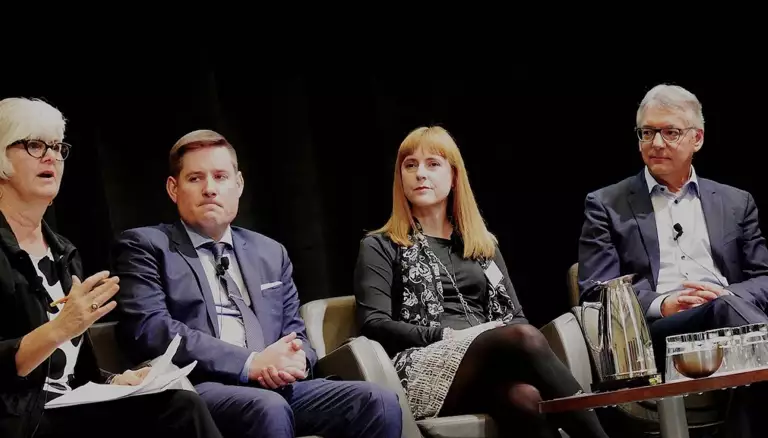
JANUARY 2020 – While economics force a massive shift in the profession, a united front is essential to sustaining pharmacy in the future, said pharmacy leaders at CFP’s annual Pharmacy Forum conference in November 2019.
Justin Bates, CEO of the Ontario Pharmacists Association, noted two key things needed for the profession to stay relevant in the long-term. “It’s about clearly articulating the economic value of pharmacy to payers and mobilizing support at the grass roots,” he said. “I think patients care about pharmacists but they’re not championing our cause yet.”
He described the current pharmacy model as the “fast food of healthcare” and the key challenge in figuring out how to fund the transformation needed to go from a transactional to patient care one. “I don’t think we have the [right] model yet as there are so many variations of how it can be implemented,” he said.
Key to finding the right one is in getting pharmacy stakeholders to put aside their differences to come up with solutions, said Jean Bourcier, CEO of the Association québécoise des pharmaciens propriétaires. “We know we can’t have a one-size-fits-all model but we can help each other with proof of concepts that do work,” he said. “We’re not controlling politics but we do control our relationships with patients so let’s put more emphasis on that and leverage those relationships to get what we want.”
Research is another key factor needed to prove pharmacists’ worth in the healthcare system, noted Bates. “There is lots out there already, but it is not integrated…in terms of our clincial value to the healthcare system, we are an underutillized resource but we haven’t told our story in a unifed fashion,” he said. “And if you look at [CFP] we should be funding these kinds of associations to do all the research we still need.”
While everyone seems committed to moving the profession forward, pharmacy hasn’t quite hit the crisis point needed to induce true change, said Margaret Wing, CEO of the Alberta Pharmacists Association. “This cry of the wolf has been happening for a decade but until the profession no longer has autonomy to help patients, we’re not there yet.” When pharmacy does get there though, “none of us can do it alone,” she added.
As part of its annual Changing Face of Pharmacy report, the Canadian Foundation for Pharmacy...
The federal and provincial governments have enacted a wide range of temporary laws, regulations...